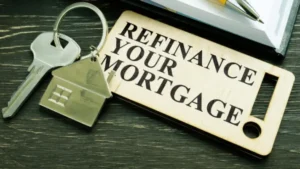In this Article
Why a Solid Budget is Important for Veterans
Life after military service can involve sudden costs—transition expenses, medical bills, or even a home purchase. Budgeting helps you make the most of your VA benefits, pensions, or civilian income without falling into debt.
In 2024, 35% of veterans surveyed said they felt financial strain. With a solid plan, you can avoid that situation and direct your money toward what matters most—like a mortgage, family needs, or investing in your future.
The Veteran Money Challenge
Many veterans face unique financial hurdles, such as lower initial salaries (around 15% less than non-veterans, according to 2024 data) or higher healthcare costs.
Having a clear budget transforms your income—be it from disability benefits or a steady paycheck—into a shield against debt. This applies to everyday living, as well as bigger goals like saving for a home in New Braunfels or relocating across the country.
Top Budgeting Tips for Veterans to Stay Debt-Free
Below are the most effective strategies to keep your finances in check. They’re straightforward, flexible, and tailored to fit a veteran’s lifestyle.
Track Every Dollar You Spend
Monitoring your spending shows exactly where your money is going—from rent or mortgage payments to daily coffee runs. Try free apps (like Mint) or a simple notebook. One veteran realized he was spending $5 on snacks every day, which added up to about $150 a month. After a 30-day tracking period, you’ll see easy ways to cut back.Build a Lean Budget with the 50/30/20 Rule
Split your monthly take-home pay into three categories:- 50% for essential needs (housing, utilities, insurance)
- 30% for wants (dining out, hobbies)
- 20% for savings or debt repayment
For instance, if you receive $3,000 each month (from VA benefits plus a part-time job), then $1,500 covers needs, $900 goes to wants, and $600 goes straight into savings or extra loan payments.
Prioritize an Emergency Fund
Aim to save enough to cover 3–6 months of expenses. If your monthly costs are $2,000, set a goal of $6,000–$12,000 in a separate savings account. Even a small $500 cushion can prevent you from whipping out a credit card for surprise car repairs. Many banks now offer high-yield savings accounts with around 4% interest in 2025, which helps your money grow faster.Pay Off High-Interest Debt First
Credit card rates often hover around 18% APR or more. If you have a $5,000 balance at that rate, focus on paying extra ($50–$100 above the minimum) to clear it quickly. A veteran who used the “avalanche method” (tackling the highest interest debt first) saved over $1,000 in interest charges. Choose either the “avalanche” or “snowball” method—what matters is steady progress.Leverage Veteran Discounts
Military service unlocks countless discounts. Whether it’s 10% off at hardware stores, reduced phone plan rates, or free meals on Veterans Day, those savings really add up. One veteran reported saving over $300 a year on groceries with combined discounts and coupons—money that can go toward a mortgage or your emergency fund.Use VA Benefits Wisely
If you qualify for 100% disability, you could receive more than $3,600 per month in 2025 rates. Channel that steady income toward essentials, savings, or paying extra on a home loan. Look into VA housing grants or GI Bill programs, too. A veteran who used the GI Bill avoided taking on student debt, freeing up funds for a future home purchase.Avoid Lifestyle Creep
Landing a higher-paying job or boosting your pension can be exciting, but try not to inflate your expenses too quickly. If you’re accustomed to $1,200 rent, resist the urge to jump to $1,800 right away. One veteran saved $400 a month by sticking with his affordable truck payments rather than upgrading. That extra cash can go into investments or paying off your mortgage faster.
Budgeting Tools and Resources for Veterans
You don’t have to handle everything on your own—these resources make budgeting easier and more effective.
Free Apps and Trackers
- YNAB (You Need a Budget): Costs $14.99/month, but many users swear by its “every dollar has a job” approach, often saving $200 or more each month.
- Mint: A free app that categorizes your spending in real-time; it helped one veteran detect and stop unnecessary subscription charges of about $150 total.
- VA’s Money Smart: A free online tool with straightforward advice on living debt-free.
Veteran-Specific Support
- Military OneSource: Offers free financial counseling. One veteran successfully built a $10,000 emergency fund after working with an advisor.
- DAV Financial Literacy Workshops: Check with your local Disabled American Veterans (DAV) chapter for budgeting seminars and personalized help.
Sample Veteran Budget Breakdown
Below is an example of how to allocate a $3,500 monthly income (combining VA benefits and a part-time salary).
| Category | Amount | Percentage | Notes |
|---|---|---|---|
| Needs (Rent, Bills) | $1,750 | 50% | Covers $1,200 rent plus utilities |
| Wants (Dining, Fun) | $1,050 | 30% | Includes $200 for eating out |
| Savings/Debt Repayment | $700 | 20% | $500 to savings, $200 toward any debt |
If you’re also planning to buy a home soon, you could shift more of your budget into a down payment fund, ensuring you’ll be ready for mortgage approval when the time comes.
Military OneSource
Military OneSource also provides free financial counseling and budgeting guidance for both active-duty members and veterans. By pairing participants with knowledgeable advisors, it helps them tackle everyday money issues and plan for the future. Through a personalized approach, veterans can learn debt management, expense tracking, and effective spending habits responsibly.
- Offers free financial counseling to all service branches
- Provides one-on-one budgeting help from certified professionals
- Includes robust online resources and 24/7 phone support
Operation Homefront
Operation Homefront provides emergency financial assistance for veterans, ensuring basic needs like housing, utilities, and groceries are covered. By offering rapid relief during crises, it helps families avoid high-interest loans or significant debt. This safety net grants service members stability, actively supporting recovery and fostering long-term resilience and security nationwide.
- Covers immediate needs for housing, food, and more
- Provides swift financial relief to prevent debt accumulation
- Supports stability and strengthens resilience in crisis
VeteransPlus
VeteransPlus offers personalized financial education and resources, focusing on debt management, budgeting, and credit building. Their tailored approach addresses veterans’ unique challenges, enabling informed decisions and stronger overall financial health. With expert guidance, clients learn practical techniques to reduce debt, enhance savings, and secure greater long-term stability for their families.
- Specializes in debt consolidation strategies
- Provides tools for better budgeting and expense tracking
- Offers one-on-one credit counseling tailored to veteran needs
Navy Federal Credit Union (Veterans Focus)
Navy Federal Credit Union focuses on veteran-friendly banking solutions, offering low-interest loans, credit cards, and financial planning resources. With user-friendly online tools, members can monitor spending, set goals, and prioritize debt repayment. Tailored programs, such as interest rate reductions, help veterans overcome financial hurdles and maintain long-term stability and resilience.
- Offers special rates and terms for service members
- Provides digital budgeting and spending tools
- Helps veterans consolidate debt with lower interest options
How to Start Budgeting as a Veteran
New to budgeting? Use these steps for a smooth start toward debt-free living, homeownership goals, or both.
Step-by-Step Guide
| Step | Action | Why It Helps |
|---|---|---|
| List Income | Sum all sources | Reveals total money you can allocate |
| Tally Expenses | Track your spending | Identifies unnecessary costs |
| Set Goals | Define targets | Keeps you focused on saving or debt payoff |
| Cut Waste | Trim extras | Frees up cash for bigger priorities |
| Review Monthly | Check and tweak | Keeps your plan accurate and updated |
- List Income: Include VA benefits, pensions, wages, and side gigs—say you total $3,000 per month.
- Tally Expenses: Write down housing, food, transportation, and any other costs for at least 30 days.
- Set Goals: Aim to save $1,000 initially, or pay off a $2,000 credit card balance within a year.
- Cut Waste: Identify any forgotten subscriptions or overpriced services you can cancel.
- Review Monthly: Check your spending to stay on track and make quick adjustments when needed.
Common Debt Traps (And How to Avoid Them)
Even a good budget can suffer if you fall into these pitfalls. Here’s how to steer clear:
- Overusing Credit Cards: Aim to charge only what you can fully pay off each month. A veteran capped his card limit at $300 to prevent overspending.
- Expensive Car Loans: Consider buying a reliable used vehicle at $15,000 instead of a $30,000 new car to save on monthly payments and insurance.
- Payday Loans: The interest rates can be outrageous (up to 400% APR). If you’re in a pinch, look into VA emergency funds or local military relief programs first.
FAQs About Budgeting Tips for Veterans
What are the best budgeting tips for veterans to avoid debt?
Track daily expenses, use a 50/30/20 budget plan, and build an emergency fund of at least $500. These basics help keep debt at bay.How can veterans create a budget to avoid debt?
List all income sources (like VA benefits) and subtract monthly expenses. Use free apps (Mint) or simple spreadsheets to monitor spending, then adjust each month.What’s the best way for veterans to save money?
Start by automatically transferring $25–$50 a week into a dedicated savings account. Over a year, that adds up to over $1,000. Look for veteran discounts to stretch your income further.Can VA benefits help veterans avoid debt?
Yes. If you’re eligible for disability or other VA benefits, you can use those funds to cover essential costs, build savings, or pay down loans more quickly.How do veterans pay off debt fast?
Concentrate on high-interest debts first. Paying extra on the highest APR cards or loans saves money on interest, allowing you to become debt-free faster.What apps help veterans budget to avoid debt?
Mint is free and user-friendly for daily spending. YNAB, while paid, offers a more detailed approach to assigning every dollar a job.How can veterans avoid credit card debt?
Use a low-limit card, pay it off in full each month, or switch to cash for smaller purchases. This strategy helps prevent a high running balance.Are there free budgeting resources for veterans?
Yes. Organizations like Military OneSource and local DAV chapters offer financial counseling and workshops at no cost to you.
Challenges Veterans Face (And Fixes)
Budgeting can be tough when your income is mostly fixed (e.g., disability payments), but you have the skills to adapt:
- Fixed Income Constraints: If your pension or benefits are limited, reduce optional spending like eating out or premium streaming services.
- Medical Expenses: Use VA healthcare or other veteran-focused programs to offset big bills.
- Impulse Purchases: Set a modest “fun money” limit each month (e.g., $50–$100). Once it’s gone, pause unnecessary spending until next month.
Why Budgeting Wins for Veterans
Whether you’re saving for a dream home, tackling medical bills, or simply hoping to enjoy retirement without money worries, budgeting is your foundation for financial freedom.
One veteran in New Braunfels saved $1,200 a year by combining store discounts and a basic budget plan—enough to cover unforeseen expenses without touching credit cards.
With discipline and the right strategies, your income becomes a tool for growth instead of a source of stress. Start your plan today, and your future self will thank you.























